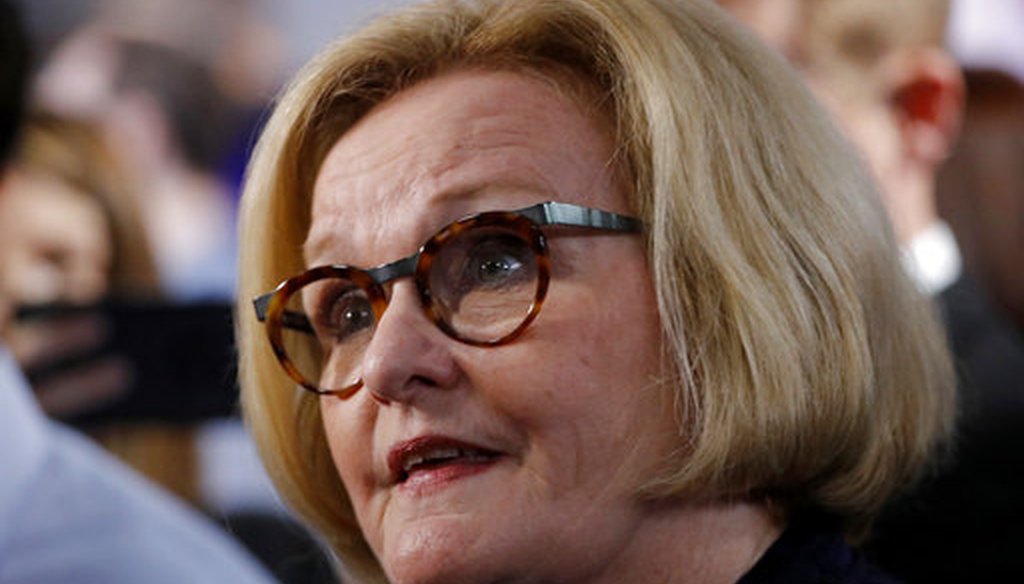



Missouri incumbent Democratic Sen. Claire McCaskill talks to the media after a debate against Republican challenger Josh Hawley on Oct. 25, 2018, in Kansas City, Mo. (AP/Charlie Riedel)
Sen. Claire McCaskill has been a supporter of the Affordable Care Act, especially when it comes to protecting pre-existing conditions.
Her opponent, Attorney General Josh Hawley, is part of a lawsuit that is trying to repeal the Affordable Care Act, which would take away mandatory coverage for people with pre-existing conditions. Hawley says he’s for protecting this coverage, just not through the current law.
During their second debate, Hawley mentioned a bill on reinsurance as a way to cover people with pre-existing conditions. The measure is sponsored by Sen. Bill Nelson, D-Fla., and Susan Collins, R-Maine.
McCaskill’s rebuttal was quite clear:
"The Collins-Nelson bill will not protect pre-existing conditions. It has nothing to do with pre-existing conditions," she said.
So who is right?
We reached out to the McCaskill campaign for evidence, which pointed to a CNBC article. We decided to check out the bill for ourselves.
When Collins introduced the bill, she said it was "a bill that would allow states to protect people with pre-existing conditions while lowering premiums through the use of these high-risk pools."
But the bill doesn’t actually contain the words "pre-existing conditions" — more on that in a second.
The bill’s actual name is the Lower Premiums Through Reinsurance Act of 2017. It’s intended to "reinsure" insurance companies for taking on high-risk individuals. The bill would allow states to design their own reinsurance programs, which would then allow them to be eligible for federal funding.
The bill would allocate $4.5 billion over two years, and states could use the federal funding to provide the reinsurance in a way that is up to them.
At issue is the role of high-risk pools. That’s where people who have high premiums would be grouped, regardless of whether they have pre-existing conditions.
The phrase "pre-existing conditions" doesn’t show up anywhere in the bill. Instead the bill uses "high-risk" as a qualifier for funding.
Experts in health care whom we reached disagreed with McCaskill that pre-existing conditions would have nothing to do with the bill.
Anup Malani, professor of law and medicine at the University of Chicago, said that many pre-existing conditions would qualify as a high-risk of using medical care.
Alan B. Cohen, research professor at Boston University, believes there is no straight-forward answer, as reinsurance programs just shift the risk from one entity to another.
Cohen brought up an interesting point that the bill does not mention in the definition of "high-risk" individuals. "It is plausible that a state could define high-risk individuals as those with pre-existing medical conditions, but there is no guarantee that will be the case."
States would be in charge of making their own definitions of high-risk pools, and deciding whether to guarantee coverage for people with pre-existing conditions through this bill.
So although the Collins referenced pre-existing conditions when speaking on the bill, there is no guarantee that states will be able to protect everyone with a pre-existing condition. Also, this approach relies on adequate funding. States have tried high-risk pools before and they often fell short because they didn’t have enough money.
The bill is an incentive for states to reinsure insurance companies to cover individuals who are high-risk. If the government covers the costs of high risk people, then insurance companies could keep low-risk individuals’ rates low, so the logic goes.
McCaskill said, "The Collins-Nelson bill will not protect pre-existing conditions. It has nothing to do with pre-existing conditions."
The bill would help insurance companies cover individuals who are high-risk, which is a category that many pre-existing conditions fall into. While the bill allows the states to make their own decisions -- meaning there’s no guarantee that pre-existing conditions will be protected across the board -- it is an exaggeration to say it has nothing to do with pre-existing conditions.
We rate the statement Mostly False.
Email exchange with Eric Mee, McCaskill spokesman, Oct. 30, 2018.
Interview with Anup Malani, professor at the University of Chicago, Oct. 30, 2018
Email exchange with Alan B. Cohen, research professor at Boston University, Oct. 30, 2018
Email exchange with Lucy Hodder, director of health law and policy at the University of New Hampshire, Oct. 30, 2018
Email exchange with Jeffrey McCombs, Associate Professor Department of Pharmaceutical and Health Economics, USC School of Pharmacy, Nov. 1, 2018
Healthcare.gov, High-Risk Pool Plan (State)
CNBC, Why a new GOP idea won't solve biggest problem with repealing Obamacare's mandate, 28 Nov. 2017
"Lower Premiums Through Reinsurance Act of 2017." S. 1835 115th Congress (2017)
Collins.senate.gov, Congressional record
In a world of wild talk and fake news, help us stand up for the facts.
